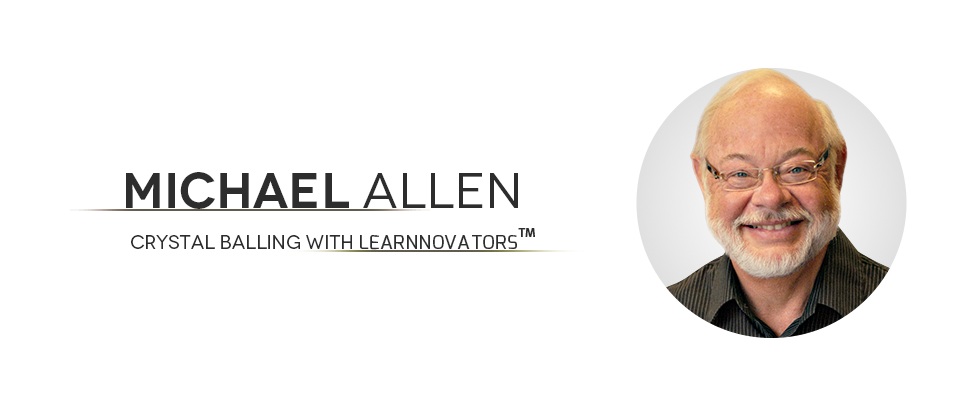Blog
Instructional Design 3.0: Designing the Learner’s Journey - Part 4: ...
‘Crystal Balling with Learnnovators’ is a thought-provoking interview series that attempts to gaze into the future of e-learning. It comprises ...

Search Our Blogs
Blog Categories
Subscribe to Our Blogs

Michael Allen Interview–Crystal Balling with Learnnovators
By Michael Allen | January 12, 2015 | Custom Learning | 0 Comments

‘Crystal Balling with Learnnovators’ is a thought-provoking interview series that attempts to gaze into the future of e-learning. It comprises stimulating discussions with industry experts and product evangelists on emerging trends in the learning landscape.
The Interview:
1. Learnnovators: For decades, you have been concentrating on defining unique methods of instructional design and development that provide meaningful and memorable learning experiences through “true” cognitive interactivity. Where do you think instructional designers stand with respect to their skills in designing learning experiences for today’s workforce? What would be your advice for them to upskill themselves for designing effective learning solutions for today’s situations?
Michael Allen: Many people responsible for instructional design today just aren’t ready to take on this complex task. This is the primary reason we see so much “tell-and-test” or “text-and-next.” It’s often not their fault; they’ve just been given the assignment by someone who doesn’t appreciate the fact that instructional design is a professional undertaking requiring a good deal of knowledge, skill, and talent.
While I’m fighting everyway I can to establish greater understanding and respect for this important profession, I’m also trying to help define methods and guidelines that simplify the process for everyone. As I’ve worked to define foundational principles and processes, I feel I’ve clarified concepts we can all use to speed up our work and help our clients participate. For example, it’s really helped to note that effective interactive instructional events are constructed of context, challenge, activity, and feedback (CCAF). There are other important constructs as well, of course, but CCAF is a pretty surefire path to successful instruction. By carefully constructing each of these components and making sure that they are tightly tied to each other, it’s hard to go wrong.
2. Learnnovators: It is a well-known fact that you cannot use yesterday’s tools to solve today’s problems. Most of us in the e-learning domain have been following ADDIE—a process that has been at the core of the instructional design discipline for years. However, ADDIE had its own limitations since it was made before we had today’s tools, challenges, and opportunities. Hence, those of us who haven’t been fully satisfied with this (process) have been using our own slightly varied adaptations. That is when you gave us Successive Approximation Model (SAM) – an agile development model that claims to help improve development efficiencies, and hence the effectiveness of learning experiences. How is the community and the industry looking at your call for leaving ADDIE behind? How is the response to your book ‘Leaving ADDIE for SAM’?
Michael Allen: This has been interesting. Far more people are responding to SAM with great enthusiasm than I would have expected, while many others are kicking the tires and checking it out. I understand that when you’ve invested a lot of time learning and applying a process, you’re reluctant to give it up even if it’s giving you fits. If you’ve built workflow aids, defined roles, and settled in, the potential upheaval of switching to a dramatically different process is frightening. Even minor tweaks to an ingrained can be tough.
Some take the stance that SAM isn’t very different from ADDIE. I’m not sure whether this reveals that we’ve done a poor job of explaining SAM, or whether people have modified their implementation of ADDIE to the point that it’s very SAM-like, or if it’s something of an excuse to avoid change. If you really get the fundamental concepts, SAM and ADDIE are very, very different, even though SAM recognizes that all the tasks identified within ADDIE are important. SAM is really quite a lot simpler, much faster, more cost-effective, and tends to produce more innovative instruction.
We tried as best as we could to explain SAM in Leaving ADDIE for SAM and to contrast it with ADDIE. Of course, we do recommend continuance of whatever you’re currently doing if it produces the quality of product you want within budget and on schedule. That’s a major achievement that shouldn’t be disrupted. But we also try to point out that you shouldn’t set your sights too low because your current process can’t give you the impact you need within the resources available. SAM does well producing the best product possible within whatever constraints exist.
3. Learnnovators: You continuously strive hard to give us not just new thoughts and recommendations, but also tools and processes that are aligned towards good (or serious) e-learning. What is your vision for the e-learning community? In other words, how do you plan to continue help creating ‘serious e-learning’ further for the new age learners with their own unique styles and preferences :)?
Michael Allen: I do get the most meaningful personal rewards from innovation. I’m constantly trying to understand what prevents us from providing those learning events that inspire and engage pretty much everyone. I so admire the creativity, innovation, technology, and business success of Disney. I guess my true aspiration is to be the Disney of e-learning.

Authoring, simulation, and interactive technologies have a long way to go to give us what we and our learners need. It seems they’ve stagnated if not regressed in recent years, so I think this is a space where I may be able to make some important contributions. I hope so. The first thing I need to do, and I’m finding this to be a major challenge, is to get the e-learning community to set higher standards, insist on meeting them, and defend themselves as professionals. We need to reverse the trend toward simplistic, cheap, text-and-next of negligible value and work toward making effective use of learner time.
In general, you can count on me to continue trying to kick us out of whatever ruts we may fall into. I want us all to be creating one epiphany after another for our learners. What’s more rewarding than realizing you’ve helped someone become both competent and confident in a new skill? I wish that for myself and everyone.
Want to check out the whole interview? View it now at Learnnovators.com!

About the Author: Michael Allen
Michael W. Allen, PhD, has been a pioneer in the e-learning industry since 1970. For decades, Allen has concentrated on defining unique methods of instructional design and development that provide meaningful, memorable, and motivational learning experiences through enhanced cognitive interactivity. He developed the advanced design and development approaches we have used at Allen Interactions for the past three decades, including CCAF-based design and the SAM process for iterative, collaborative development. Michael is a prolific writer, sought-after conference speaker, and recognized industry leader, having written or edited nine books on designing effective e-learning solutions, including his latest edition: Michael Allen’s Guide to e-Learning. He has contributed chapters to textbooks and handbooks published by leading authors and associations.
Comments
Would you like to leave a comment?
Related Blog Posts
.png?width=316&name=2023%20Blog%20Covers%20and%20In-Line%20Graphics%20(59).png)
By: Michael Allen | Dec, 2022
Category: Custom Learning, Dr. Michael Allen
.png?width=316&name=2023%20Blog%20Covers%20and%20In-Line%20Graphics%20(61).png)
Blog
Instructional Design 3.0: Designing the Learner’s Journey - Part 5 - The ...
‘Crystal Balling with Learnnovators’ is a thought-provoking interview series that attempts to gaze into the future of e-learning. It comprises ...
By: Michael Allen | Dec, 2022
Category: Custom Learning, Dr. Michael Allen
.png?width=316&name=2023%20Blog%20Covers%20and%20In-Line%20Graphics%20(58).png)
Blog
Instructional Design 3.0: Designing the Learner’s Journey - Part 3: Getting ...
‘Crystal Balling with Learnnovators’ is a thought-provoking interview series that attempts to gaze into the future of e-learning. It comprises ...
By: Michael Allen | Mar, 2021
Category: Custom Learning, Dr. Michael Allen


